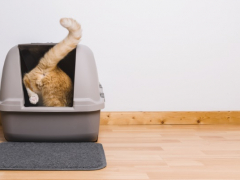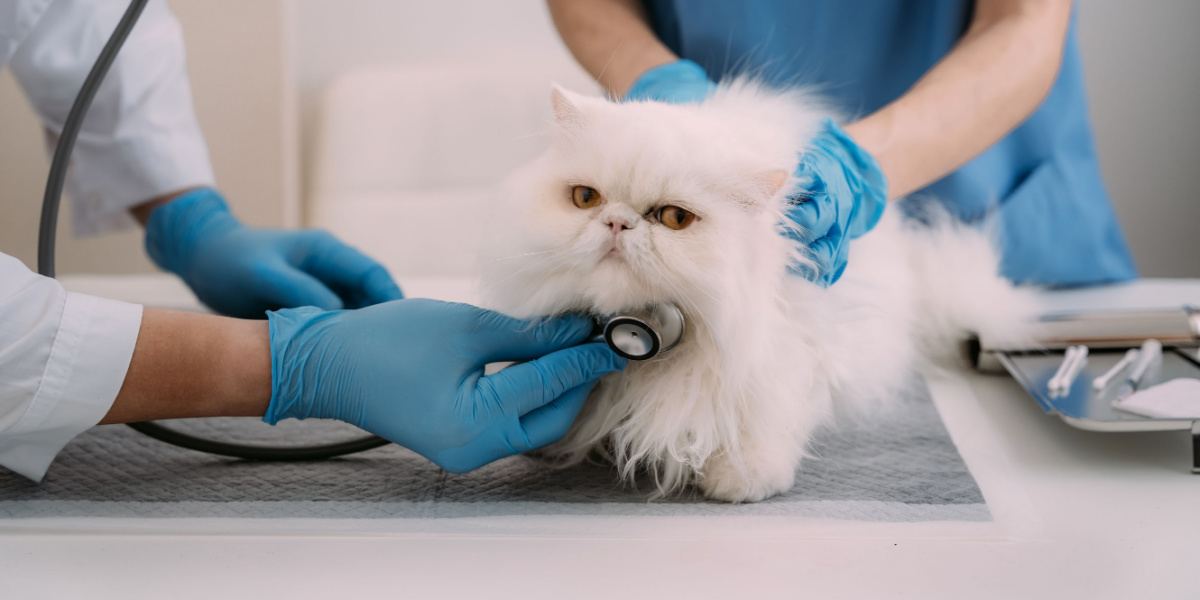
We all love our cats and want them to stay healthy and well for a long and happy life. As cat owners, there are several common cat viruses to know about and watch out for. Your cat’s immune system is in charge of protecting them from infection and disease, but even healthy cats can catch viral infections.
Prioritizing wellness for our pets includes knowing about some of the more common cat viruses, so we know how to prevent disease and when we need to seek veterinary care.
In this article, we go through some common types of viral diseases in cats, their causes, symptoms, and available treatments.
Viral disease is common in cats but can present in many different ways. Common cat viruses include feline immunodeficiency virus, feline leukemia virus, feline coronavirus, feline panleukopenia virus, feline herpesvirus, and calicivirus and rabies. Many of these viruses can be prevented by vaccination.Key Takeaways
What Are Viruses?
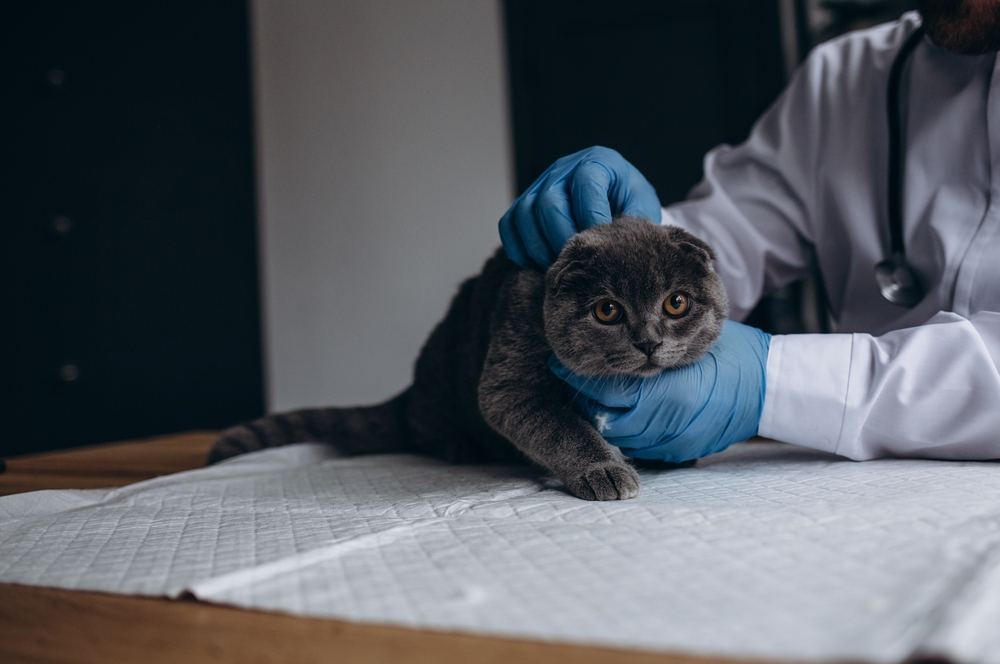
Knowing the symptoms, signs, and appropriate treatment for common cat viruses equips us with the tools to give our cats good lives.
Viruses are tiny microbes made up of a core of genetic material (DNA or RNA) surrounded by protective proteins. They are only able to replicate inside the cells of a living organism. Once they have taken over a host cell, they direct this host to produce vast quantities of copies of themselves, leading to rapid spread.
Viruses are a very diverse group: they come in different shapes and structures, infect different types of hosts, are spread by various methods, and cause a large range of clinical signs and diseases.
Also Read: 10 Most Dangerous Diseases In Cats
What Are The Most Common Cat Viruses?
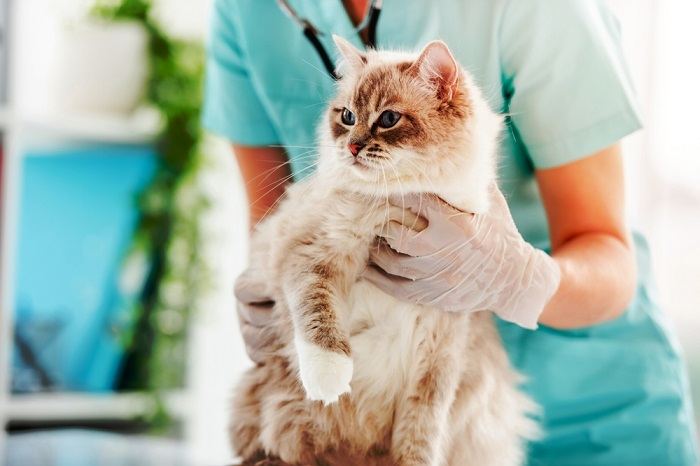
While there is a long list of cat viruses, some are more common than others, widdling down the list to the most likely culprits.
There are a huge number of viruses that can infect our cats and can affect cat health in a variety of ways, from mild to life-threatening diseases.
Here are some common cat viruses.
#1 Feline Immunodeficiency Virus (FIV)
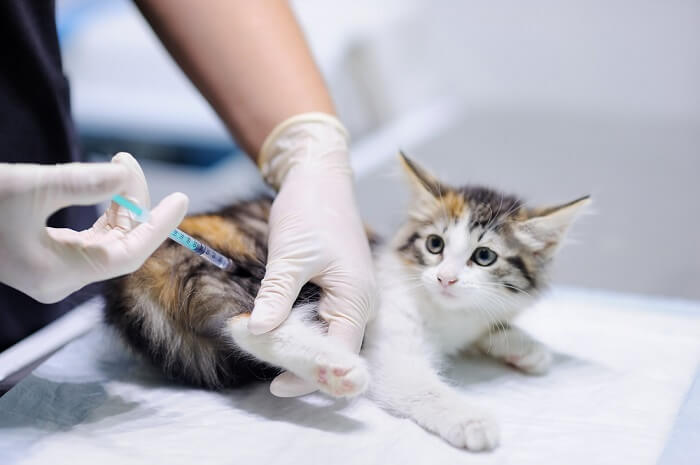
Some common cat viruses have vaccines to fight against them. Others require the management of symptoms throughout a cat’s life.
FIV is a common cat virus in felines worldwide. Feline immunodeficiency virus belongs to the retrovirus family, in the lentivirus group. It is spread via saliva secretions – most commonly via bite wounds, but occasionally through mutual grooming, from a mother to kittens. It can also spread through blood transfusion. FIV does not survive well in the environment and is killed by most disinfectants. Infected cats usually remain infected for life.
FIV is similar to HIV in humans, but is species-specific: infected cats cannot cause disease in humans and vice versa. The symptoms of FIV vary, as the virus causes disease via immunosuppression. The virus attacks the immune system, damaging white blood cells. Early signs include a mild fever and mild enlargement of lymph nodes.
Over time, the infected cat becomes more susceptible to other diseases, such as infections. They may suffer from repeated bacterial infections or respond poorly to treatments for other health conditions. Common signs include recurrent fevers, weight loss, recurrent respiratory and neurologic disorders, chronic gum and mouth inflammation (gingivitis and stomatitis), and intestinal disease.
FIV can be diagnosed via blood tests, which look for antibodies against the disease. There is no specific treatment, with individuals managed according to their symptoms.
#2 Feline Leukemia Virus (FeLV)
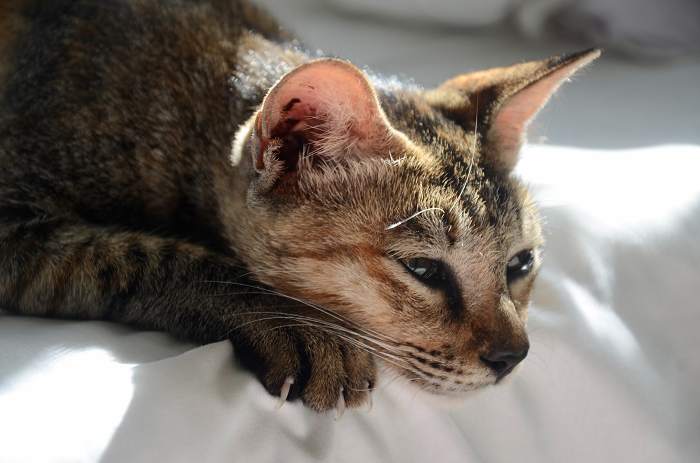
While there is no cure for FeLV, there is thankfully a vaccine against the condition.
FeLV is another common cat virus. Infected cats shed the virus in saliva and other bodily fluids such as milk and urine, as well as potentially in the feces. Kittens born to an infected queen will be also infected, but most transmissions are through social contact, such as grooming, sharing food and water bowls, and communal litter boxes.
Once infected, the virus spreads to the bone marrow. Some cats can mount an effective immune response to subdue the infection, but many have persistent levels of the virus and are susceptible to developing FeLV-related disease.
There are again a variety of symptoms. FeLV can cause immunosuppression, leading to recurrent diseases and secondary infections in around 50% of cases2. It also commonly causes anemia in around 25% of infected cats. Around 15% of FeLV-related disease is the development of cancers such as lymphoma2. Other related health problems include skin conditions and reproductive issues.
There is no cure for FeLV, and treatment is usually aimed at the specific symptoms shown by affected cats. A vaccine is available.
Also Read: Feline Leukemia Vaccine: Cost, Schedule & Side Effects
#3 Feline Coronavirus (FCoV)
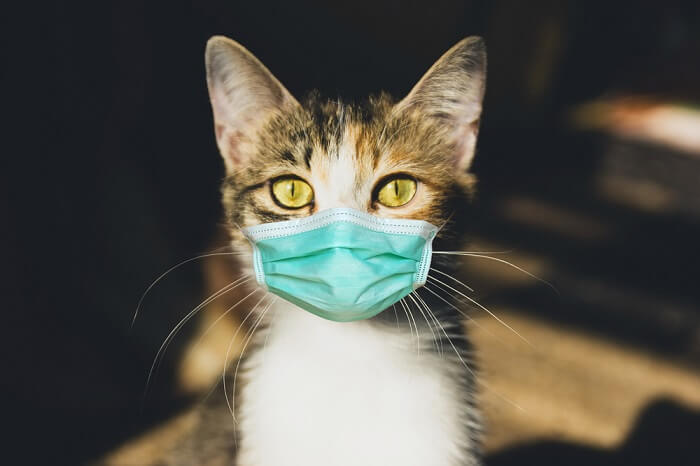
Coronaviruses don’t affect just humans. Felines can fall victim to them as well.
Coronaviruses are very common viruses, found in multiple forms in multiple species, and usually cause mild to moderate disease of the gastrointestinal and/or upper respiratory tract. However, in cats, coronavirus can mutate, and interact with the cat’s immune system to cause a disease called feline infectious peritonitis (FIP). This common cat disease is usually seen in young adult cats rather than older cats.
FIP causes severe disease in cats. Early signs are mild and non-specific, such as an intermittent fever and a loss of appetite. Symptoms then progress to more severe signs, such as the accumulation of fluid in the abdomen and chest, causing a swollen tummy and difficulty breathing. Granulomas (accumulations of viral and inflammatory cells) can form in many organs, causing diverse signs from neurological symptoms to kidney disease.
Infectious peritonitis can be difficult to both diagnose and treat. There are some recent and exciting advances in potential antiviral drugs to tackle this challenging condition1.
#4 Feline Panleukopenia Virus (FPV)

FPV is a serious and highly contagious cat virus.
One of the more common cat viruses is the feline panleukopenia virus, otherwise known as feline parvovirus. It causes infectious enteritis in cats and kittens and is also known as feline distemper. It is one of the common causes of death in young kittens.
The virus is spread by direct contact with the viral particles, usually by the fecal-oral route, or indirectly through the virus shed into the environment. It is highly infectious. Once infected, the virus affects the gastrointestinal tract, causing severe vomiting and diarrhea. The virus also travels to the bone marrow and lymph glands, causing a lack of both red and white blood cells.
The disease has a very acute onset and can be rapidly fatal. If a pregnant cat is infected, the developing brains of the kittens can be affected, leaving them with a condition called cerebellar hypoplasia.
There is no specific treatment, but intensive supportive care is recommended. Infected cats must be separated from others, as the virus is highly contagious. There is an effective vaccine available.
Also Read: Cat Vaccinations: What You Need To Know?
#5 Feline Herpesvirus (FHV)
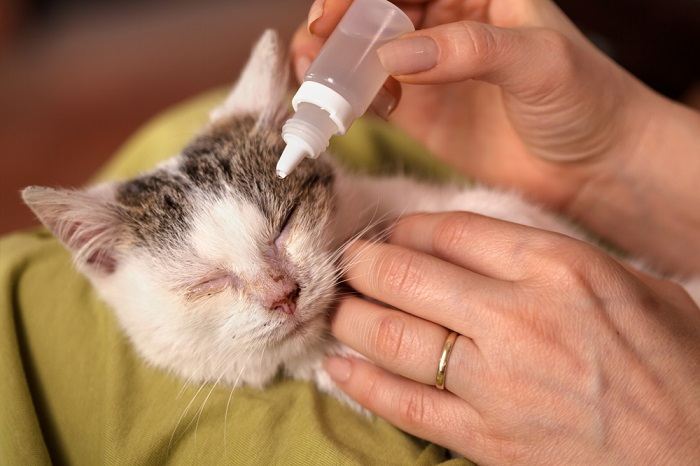
FHV is contagious and can spread between cats in a highly infected space.
Feline herpesvirus, alongside feline calicivirus, is one of the main causes of upper respiratory infections in cats – otherwise known as cat flu. It is very contagious and spread by contact with saliva, or ocular and nasal secretions, or through sharing food bowls, bedding, and litter boxes. FHV doesn’t survive well in the environment, but spread through these means is possible in a highly contaminated home.
Symptoms usually relate to the respiratory tract, such as sneezing, nasal discharge, salivation, fever, lethargy, and a poor appetite. FHV can also cause keratitis (inflammation of the cornea) and conjunctivitis, and in rare cases can present as ulcers on the skin around the nose and mouth.
Treatment usually involves supportive care to maintain hydration and appetite. Secondary infection is common, so antibiotics may be prescribed. Feline herpesvirus does show some response to some antiviral medications. A vaccine is available.
Also Read: Cat Cold: Causes, Symptoms, & Treatment
#6 Feline Calicivirus (FCV)
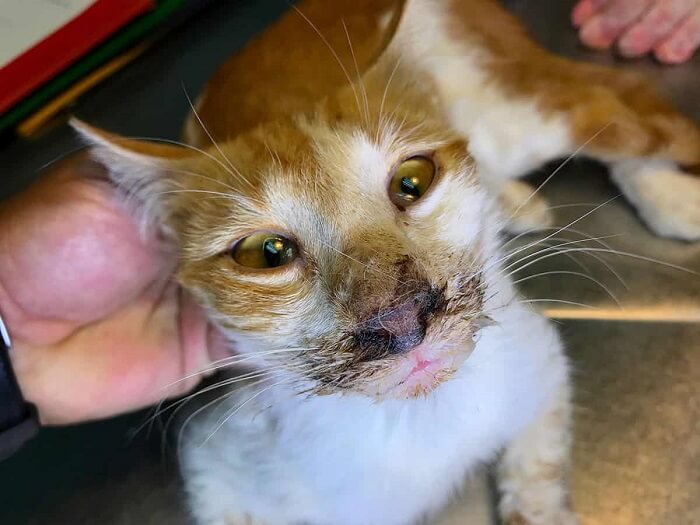
FCV can survive on surfaces in an environment for up to two weeks.
Similar to feline herpesvirus, FCV is usually associated with respiratory infections. It is also spread through contact with sneeze droplets and other secretions but survives for longer in the environment (around 14 days), so cats can be infected by things like bedding and shared grooming brushes.
Calicivirus causes mostly upper respiratory signs in cats, such as sneezing, nasal and ocular discharges, inappetence, and fever. It is also associated with inflammation and ulceration of the mouth and gums (gingivitis and stomatitis). In young cats, it can cause transient limping syndrome due to joint inflammation.
Treatment is similar as for herpesvirus, but antiviral medications are not widely used due to a lack of efficacy. Vaccination is available.
Also Read: Laryngitis In Cats: Causes, Symptoms, & Treatment
#7 Rabies

Rabies is a devastating and fatal disease. Thankfully, there are vaccinations against it.
Outdoor cats are at risk of coming into contact with animals infected with rabies. This lyssavirus is transmitted via saliva, usually as a result of a bite. Rabies affects a cat’s brain and spinal cord, leading to symptoms such as behavioral change, fever, excess salivation, weakness, disorientation, collapse, and seizures. It is almost always fatal. A vaccine is available and is mandated in some areas.
Also Read: Rabies Vaccine For Cats: Cost, Side Effects And Effectiveness
Common Cat Viruses: Summing Up
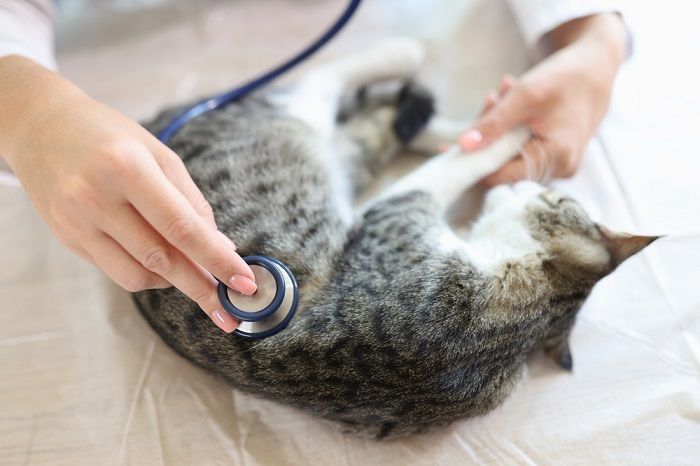
Allow your veterinarian to guide you on how to prevent and treat common cat diseases.
Viruses are a common source of infectious diseases in cats, with a wide variety of syndromes caused. Pet owners, especially of a new cat, should be aware of common infectious diseases in cats: how they present, and how they can be prevented or treated. If your cat seems unwell, always seek veterinary advice.
Also Read: 10 Subtle Signs Your Cat May Be Sick
Frequently Asked Questions
What are the most common cat viruses?
Common viruses in cats include feline immunodeficiency virus (FIV), feline leukemia virus (FeLV), feline coronavirus (leading to infectious peritonitis), feline panleukopenia virus, feline herpesvirus and calicivirus, and rabies.
What are seven diseases caused by viruses in cats?
Rabies, cat flu (caused by feline herpesvirus and calicivirus), infectious enteritis or distemper (caused by feline panleukopenia virus), infectious peritonitis (caused by mutation of coronavirus), feline immunodeficiency virus (FIV), feline leukemia virus (FeLV) and feline hepatitis.
-
Beatty, J. & Hartmann, K. (2021) ‘Advances in Feline Viruses and Viral Diseases.’ Viruses 13(5)
-
Studer N., Lutz H., Saegerman C., Gönczi E., Meli M.L., Boo G., Hartmann K., Hosie M.J., Moestl K., Tasker S. (2019) ‘Pan-European Study on the Prevalence of the Feline Leukaemia Virus Infection—Reported by the European Advisory Board on Cat Diseases (ABCD Europe)’ Viruses. 11:993







